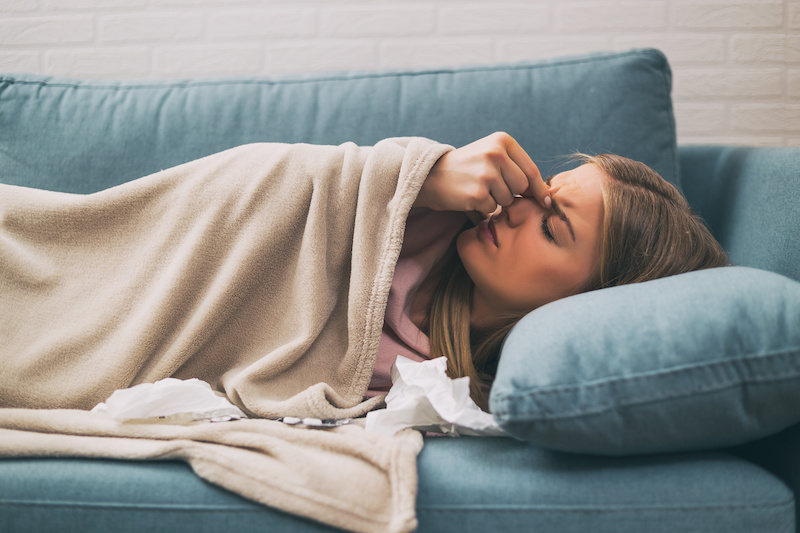
Sleep apnea and sinusitis are both health conditions that reduce your quality of sleep by disrupting your breathing. While Obstructive Sleep Apnea (OSA) blocks the throat, a sinus inflammation blocks the nasal passages. The result of either condition is an inability to get a good night’s sleep because you were unable to breathe. When you are experiencing those disruptions, your brain is telling your body to go to sleep. When this happens on a regular basis, it leads to chronic sleep loss and fatigue.
Chronic sleep loss also leads to a whole host of other health problems from high blood pressure to diabetes. If you think you are suffering from sleep apnea, sinusitis, or both, the best way to combat this and regain your ability to sleep well is by learning more about the two, how they are related, how they are not related, and finding a doctor to help you sleep better.
What Is Sinusitis?
Sinusitis is caused by swelling and inflammation in the nasal cavities. The nasal cavities, also known as sinuses, are located in two areas of the face: the forehead just above the area between the eyebrows and under the eyes in each cheek.
The sinus cavity is surrounded by bone, lined with fine hairs called cilia that work like brooms, and are filled air. Sinuses also produce mucus, which is used as a protectant for the nasal cavities. Each time you inhale through your nose, this mucus and cilia work together to trap dust, dirt, pollutants, bacteria, and other particles to stop them from entering your body, especially your lungs.
Normally, the sinuses drain every 10 minutes to maintain a clear passage. When you get a cold or suffer from allergies, the nasal passages typically swell up, which blocks the flow of the sinuses. However, when you are sick, your nasal passages are unable to clean themselves naturally and causes a build-up of mucus that contains bacteria.
If this bacteria continues to build up in the nasal passages, it leads to inflammation. This inflammation of your nasal passages is better known as sinusitis. If left untreated, this condition becomes chronic, can last up to eight weeks, and is likely to interrupt your sleep. You may also have facial pain and a runny nose along with headaches.
You can decrease your risk of sinusitis by reducing your exposure to conditions known to cause it:
- Swimming in Polluted Waters. Polluted waters can include oceans, lakes, and rivers. This doesn’t mean you can’t go to the beach, but if your main source of cardiovascular exercise is swimming and you suffer from sinusitis frequently, you may want to consider how often to swim in untreated waters.
- Smoking. Smoking in itself has several known side effects, but one of those can be sinusitis. This is also true for those exposed to secondhand smoke.
- Frequent Contact With Children. Individuals who are regularly in contact with school-aged children are more likely to be exposed to bacteria and colds, leading to sinus conditions.
What Is Sleep Apnea?
Sleep apnea is a sleep disorder that results in interrupted sleep, caused by breathing problems.
When you are diagnosed with one of the three types of sleep apnea, it means that your upper airway is blocked when you are asleep. The blockage can be slight or complete and can leave you gasping for air. When this happens, your brain should receive the message to breathe, but instead, you stop breathing while sleeping.
Most of the time, you wake up after not breathing for a certain period of time and regain your breathing pattern. However, this disrupts your sleep and prevents it from reaching the critical deep sleep stage. The result is you’ll feel tired and irritable during the day because you never reached that crucial deep state of sleep.
In the short-term, it may feel like this chronic lack of sleep is manageable if you are in a stressful period in your personal or professional life (i.e.: moving or having a big project at work), but in the long run, that daytime fogginess and fatigue that makes you more irritable can lead to a whole host of more serious health problems. If untreated, chronic lack of sleep and accompanying stress may lead to high blood pressure, heart attacks, obesity, high cholesterol, and diabetes.
Is There a Connection Between Sinusitis and Sleep Apnea?
Medical research has shown that just because you are diagnosed with sleep apnea does not mean you will automatically develop sinusitis and vice versa. There is a slight increase that an individual with sleep apnea will also develop sinusitis, but the research is fuzzy on a clear link between the two.
A 2016 study is one of the most often cited scholarly articles on the topic, but it doesn’t offer conclusive answers. Researchers followed 971 people with OSA, as well as 4,855 people not diagnosed with OSA, for five years. The researchers reported fewer than seven percent of people with OSA were later diagnosed with sinusitis. Among those without OSA, only two percent developed sinusitis, therefore there is no conclusive evidence linking the two.
A year later, doctors from Northwestern University and Rush University Medical Center studied general sleep disruptions in individuals with chronic rhinosinusitis. They noticed in preparation for their research that the medical community had not yet found any consistent links between the two.
The only known link between the two is that they can both disrupt your ability to get a good night’s rest by preventing you from breathing well. It’s frustrating to hear that the answer to something impacting your health is either maybe or it depends, but that is unfortunately the case here. Aside from routine maintenance of your CPAP machine, which we’ll cover later in this post, lifestyle changes such as losing weight and quitting smoking may also help.
Does Nasal Congestion and Allergies Cause Sleep Apnea?
When you have nasal congestion, you are unable to breathe properly at any time throughout the day. However, at night, you will likely notice that it is more difficult to fall asleep because of stuffed or runny sinuses. This blockage prevents you from staying asleep—just as with sleep apnea. One of your first lines of defense against nasal congestion is a NetiPot, which helps clear your nasal passages. After talking to your doctor, if a few rounds with a NetiPot does not work, then you should seek medical care as it may be sinusitis.
But are sleep apnea and sinus infections related, and can you avoid sleep apnea by treating sinusitis?
OSA is a sleep disorder while sinusitis is a temporary infection. Once you have successfully treated sinus problems, you will not suffer from breathing problems at night that were caused by a sinus infection. This means that sinusitis will eventually clear itself or may be treated with antibiotics. Whereas OSA is a disorder that is manageable and relatively benign but for which there is not a medication-based cure.
Note that there are two types of nasal congestions that can increase your risk factor for OSA:
- Anatomical Problems. If you have nasal congestion due to an anatomical problem, this can cause a chronic loss of sleep. In this case, find a doctor that can help you with your OSA, but keep in mind that surgery is often a last-resort solution.
- Chronic Allergies. If you have chronic allergies that consistently prevent you from having clear nasal passages, then you may develop OSA but they are not mutually exclusive. If you live in an area that is prone to seasonal colds and allergies, then you may also want to keep in mind how to use CPAP when you have a cold or symptoms associated with it that may disrupt your sleep.
To be diagnosed with OSA, you will need to get a sleep study through a medical provider at home or in a sleep study clinic. Based on your sleep test results, your doctor may recommend a CPAP machine for treating your sleep apnea.
Learn more about our home sleep apnea test kit.
Can Your CPAP Machine Make You Sick?
It’s unlikely that you’ll get sick from your CPAP alone, but if you think you’re getting sick from using your CPAP, it’s possible it needs a thorough cleaning. Using a CPAP machine in itself shouldn’t make you sick, but using a dirty CPAP machine definitely can. Some risks associated with using a dirty CPAP or one that hasn’t been used or cleaned in a while includes:
- Skin Rashes or Infections. Your CPAP mask rests on your face and is in contact with the germs and bacteria on the skin. Over time, bacteria and oils on a dirty mask may give you a rash or infection on your face.
- Respiratory Problems. If you don’t replace the humidifier water frequently or don’t wash it often enough, it’s possible for mold to develop and for you to breathe in that mold, which comes with a series of problematic respiratory problems.
Like any medical device, your CPAP machine requires routine maintenance.
Cleaning the inside of the hose, your mask, and changing your air filter are all part of cleaning your CPAP machine. Performing this routine maintenance is easy and can save you from unnecessary visits to the doctor. If you are not sure how to clean your CPAP, you can consult your specific CPAP machine’s owner’s manual.
Most routine maintenance of CPAP machines is pretty easy and involves only but a little scrubbing, hot water, and vinegar, but there are also machines designed to clean your CPAP accessories.
The bottom line is that sinus-related issues combined with your sleep apnea could be getting in the way of your productive sleep. We want you to be able to get the rest you deserve in order to be well-rested, motivated, and free from daytime fatigue. When in doubt, don’t forget to clean your CPAP equipment as recommended, and if you still think you are having sinus troubles while using your CPAP equipment, consult your doctor.
The post What Is the Connection Between Sinusitis and Sleep Apnea? appeared first on CPAP.com Blog.
